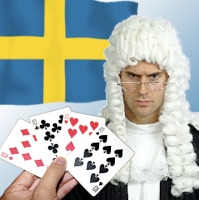On Tuesday, the seemingly never ending debate over whether poker is a game of skill or chance entered a new phase in Sweden’s Supreme Court. The case the Court is considering involves a 2007 land-based Texas Hold ‘Em tournament in Grebbestad, at which 700 players battled for several days for a multi-million kronor prize pool. In 2008, four of the organizers were convicted for running afoul of Sweden’s gambling laws. Two of the four were exonerated in 2009, while the other two had their sentences reduced. Sweden’s Prosecutor-General appealed this ruling to the Supreme Court, and here we are.
 The skill/chance argument is of paramount importance to the case, as the country’s laws require the game being played to depend “to a substantial degree” on chance for it to be considered illegal. The defendants argued that the sheer length of the tournament demonstrated that skill and judgment were better predictors of overall success than the randomness of the cards players were dealt.
The skill/chance argument is of paramount importance to the case, as the country’s laws require the game being played to depend “to a substantial degree” on chance for it to be considered illegal. The defendants argued that the sheer length of the tournament demonstrated that skill and judgment were better predictors of overall success than the randomness of the cards players were dealt.
To bolster their skill argument, the defendants brought in an unnamed ‘expert’ poker player to give the judges a tutorial on how the game is (well) played. The TT news agency reported that this expert claimed poker success depended on “courage, patience, experience, mathematical and psychological knowledge.” The witness went on to say that it takes a long time to acquire these skills, and that “you never fully complete your training.” Another expert witness, math whiz Erik Broman, acknowledged that chance did play a role in poker, but that “after the first card, skill is what matters.”
There’s no report on how the judges reacted to the ‘expert’ presentation. Swedish poker players are hoping that a favorable verdict might lead to changes in the law and a break on the monopoly control over poker tournaments currently enjoyed by state-owned Svenska Spel.
Perhaps the defendants ought to alert the judges to the makeup of the final table at the World Poker Tour Celebrity Invitational in Los Angeles. Of the six remaining players, two are renowned chess players. Almira Skripchenko is the second-ranked female chess player in France, while Dinara Khaziyeva is the third-ranked female player in Canada. Their accomplishments at reading opponents and figuring out mathematical options on the chess board appear to have given them a leg up over poker pros like Scotty Nguyen and Antonio Esfandiari, who failed to make the final table cut. Or was it sheer dumb luck? Love to know what a Swedish judge might think.